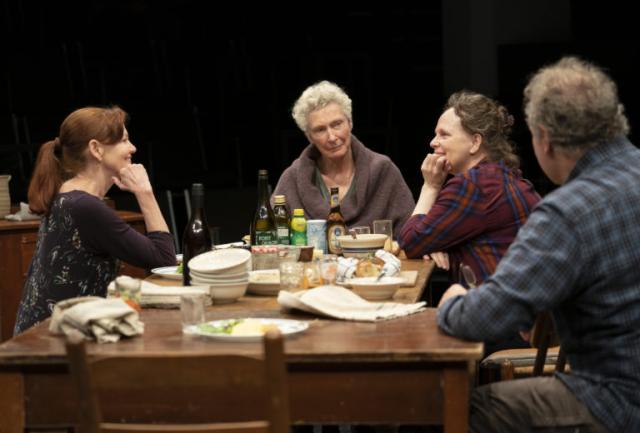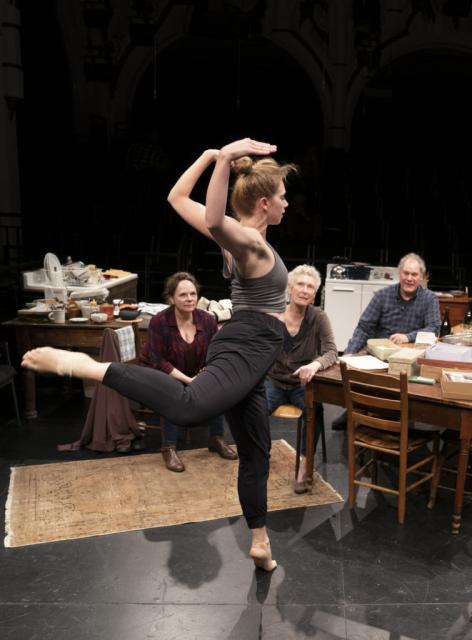

The kitchen is also a source of drama in Richard Nelson’s The Michaels at the Public. Like his previous cycle of works which premiered at the same theater, four plays that make up “The Apple Family Plays” and the three that comprise “The Gabriels,” The Michaels takes place in a middle-class abode in Rhinebeck, New York where the residents argue, connect, and review their lives as they prepare and eat a meal together in more or less real time. A major difference here is the discussions are not as overtly political as in the previous works. Each of the Apple and Gabriel pieces took place on a significant day such as the 2012 presidential election, a primary, or a major televised debate. Now the only important news is the announcement of the killing of the leader of ISIS, which receives a brief mention along with a short discussion on how our crude president is making America appear abroad.
The main action concerns Rose Michael, a semi-retired dancer and choreographer, and her battle with Stage 4 ovarian cancer. As Rose faces death, she stubbornly insists on continuing to make new dances while her daughter Lucy and niece May recreate two of her pieces for an upcoming retrospective of her work.
Also in the kitchen, partaking of quiche and talk, are David, an arts manager and Rose’s ex-husband; Sally, David’s current spouse and a former member of Rose’s company; and Irenie, another ex-dancer from the troupe. The only non-arts person present is Kate, a retired history teacher and Rose’s caretaker who makes the dinner.
Nelson, who also directs with the same understated intimacy and simplicity he brought to the previous Rhinebeck plays, insightfully depicts the interrelations of this clan of artists and friends. The play is subtitled “Conversations During Difficult Times” and the reference is not just to the current tumultuous political scene. Each of the characters has reached a turning point and must make a hard choice. Lucy has a chance for a dance residency in Europe, but it would mean leaving her ailing mother. Kate has grown close to Rose, but her former lesbian partner wants her back. There are no easy answers or resolutions, just truthful exploration of differing emotions and perspectives.
The entire company is so naturalistic and the audience is so close to Jason Adrizzone-West’s homey set it feels as if we’re eavesdropping. Brenda Wehle is heartbreakingly vulnerable as the flinty Rose, alternately raw and robust as illness ravages her and she strives to overcome it.
Jay O. Sanders (David) and Maryann Plunkett (Kate) have appeared in both the Apple and Gabriel plays and continue to create believable people coping with credible crises. There is similar clear-eyed, non-showy work from Rita Wolf’s Sally and Havilland Morris’s Irenie as well as from Charlotte Bydwell’s Lucy and Matilda Sakamoto’s May. The latter two also energetically perform the modern dance pieces their characters are rehearsing. It’s a bit of a stretch to believe they would be doing a full-out performance in a crowded kitchen, but that’s the only credulity-straining quibble in an otherwise flawless family portrait.
